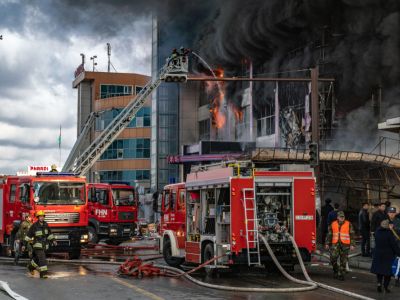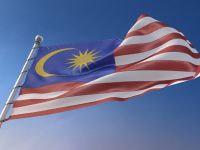Pakistani authorities breathed a sigh of relief Saturday after protests against their support for possible US military strikes on Afghanistan passed off largely peacefully, but violence in Karachi cast doubts on the port's use by US forces.
Less than 100,000 protestors took to the streets of Pakistan's main cities on Friday and there were no incidents of mass unrest to match the fiery rhetoric of the radical Islamists opposed to President Pervez Musharraf's stance in the present crisis.
Serious disturbances were limited to Karachi, where at least four people died as demonstrators clashed with police and tried to force businesses to shut down in line with their call for a general strike.
"The majority of Pakistanis did not respond to the strike called by the so-called religious leaders," a government spokesman told AFP.
"The people of Pakistan have reposed their confidence in President Musharraf's policies," he added.
Musharraf announced last week that he would support possible military action against Afghanistan over the September 11 terror attacks on the United States.
The spokesman insisted the violence in Karachi had been instigated by a "small section" of demonstrators intent on fomenting unrest.
"The government is determined not to allow a minority to disturb public peace, and those responsible for violence in Karachi will be strongly taken to task," he added.
President Musharraf held talks Saturday with provincial governors, police chiefs and some military officials on the internal security situation.
State television reported that the meeting had reviewed a contingency plan to handle the current situation.
"The government will take all necessary measures to ensure law and order in the country," it said.
The Karachi incidents and the clearly high level of organization behind the demonstrations in the city, triggered speculation the protests were aimed less at Musharraf and more at preventing the port being used by US naval forces.
There have been reports that the US requests for help from Pakistan in preparing for possible strikes against Afghanistan included docking facilities in Karachi for US naval vessels.
The threat of US military action loomed larger after the ruling Taliban regime in Afghanistan on Friday rejected an ultimatum from US President George W. Bush to hand over the main suspect in the September 11 attacks -- Osama bin Laden -- or face the consequences.
"While the Pentagon may still be weighing the full potential of the ports in Karachi, some unknown forces have tried to swiftly turn Karachi into an Osama town," The News daily quoted a senior Karachi police official as saying.
The unidentified official said he was "intrigued" at the nature and scope of Friday's violence in the city.
Foreign Ministry spokesman Riaz Mohammad Khan said the US and Pakistan had not discussed any "specific contingencies" for military action and reiterated that Islamabad would want any action authorized by the United Nations.
"Any action should be [within] the legal framework of the Security Council," he said.
Earlier Saturday, Musharraf told student leaders from across Pakistan that Islamabad could never be part of a war against Afghanistan or its people.
"The decision to support the international coalition against terrorism was based on reason," one student quoted him as saying. "It [any attack] is going to be limited to terrorists."
There have been demonstrations every day since Musharraf announced his support for US military action -- ISLAMABAD (AFP)
© 2001 Al Bawaba (www.albawaba.com)









